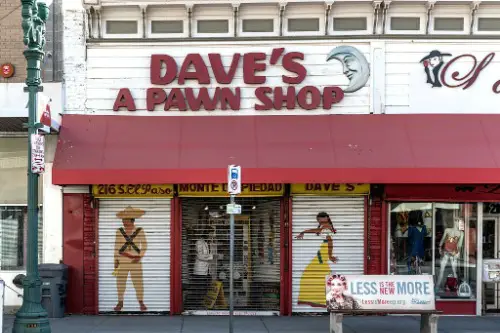1. Most People Are Just Trying to Make Ends Meet

Forget what you’ve seen in the movies—most customers aren’t criminals or shady dealers trying to offload stolen goods. The vast majority are regular folks who need quick cash to cover rent, medical bills, or car repairs, Fox 59 reports. Pawnbrokers hear heartbreaking stories daily, and many try to offer fair deals while still keeping their business afloat. It’s a delicate balance between helping someone out and making sure the shop stays profitable.
Pawn shops serve as a last resort for people who can’t or won’t go to a bank for a loan. Unlike payday lenders, pawn shops don’t charge insane interest rates, and if a customer can’t repay the loan, they simply lose the item—they don’t go into debt. Some people even use pawn shops strategically, pawning items when cash is tight and reclaiming them once their paycheck comes in. It’s less about getting rich off someone’s misfortune and more about providing a short-term safety net.
2. Not Everything Is as Valuable as You Think

People walk in convinced that their grandmother’s china set or their old VHS collection is worth a fortune. The reality? Most of these once-prized possessions have little to no resale value in today’s market, Gene’s Jewelry & Pawn explains. Pawnbrokers have to break the news gently, but they also have to stand firm when an emotional attachment clouds someone’s judgment.
Even gold and silver aren’t always a guaranteed payday, as prices fluctuate constantly. Many customers also assume that if they paid a lot for something new, it must still be worth at least half of that—but depreciation hits hard. Name brands, rarity, and demand are what truly determine an item’s value, not sentimentality. The best pawn shops know their market inside and out, but even then, predicting what will sell is a gamble.
3. Stolen Goods Are a Constant Risk

No pawn shop wants to be a hotspot for stolen items, but it’s an unfortunate reality of the business, according to LegalMatch. Most reputable shops work closely with law enforcement, logging serial numbers and requiring valid IDs to deter thieves. Still, some criminals get creative, and it can be tough to tell when someone’s lying about an item’s origin. When stolen goods do slip through, pawnbrokers are usually the ones who take the hit, losing both the item and the money they paid for it.
Experienced pawnbrokers develop a sixth sense for spotting shady deals. If someone seems nervous, refuses to answer questions, or insists on cash only, it raises red flags. Many shops have policies that require holding items for a certain period before selling, giving police time to identify stolen goods. But at the end of the day, no system is perfect, and bad deals are just part of the business.
4. Customers Can Get Really Emotional

People don’t just pawn stuff—they pawn memories, and that can make for some tough interactions, according to Forbes. It’s not uncommon for someone to burst into tears while handing over a wedding ring or a family heirloom. Pawnbrokers have to develop a thick skin while still treating customers with empathy. Some shops even keep tissues behind the counter for these moments.
On the flip side, some customers get angry when they don’t get the offer they expect. Insults, accusations of being ripped off, and even threats aren’t unheard of. A good pawnbroker knows how to diffuse tension, but not every interaction can be smoothed over. There are days when it feels less like running a shop and more like being a therapist, referee, and security guard all in one.
5. The Best Deals Come from People Who Don’t Know What They Have

Every now and then, someone walks in with an item they think is junk but turns out to be worth a small fortune. It might be a rare coin, an old watch, or a collectible they picked up at a garage sale. Some pawn shops have made huge profits off customers who didn’t bother to do their homework. It’s not exactly dishonest, but it does make for some incredible finds.
Of course, there’s an ethical side to this—some pawnbrokers will clue customers in if they’re about to undersell something valuable. Others take the “buyer beware” approach, assuming it’s the seller’s responsibility to know what they have. Either way, pawn shops thrive on these lucky breaks, and seasoned dealers have a sharp eye for spotting them. It’s one of the reasons why some people love the business—it’s part skill, part luck, and always a little bit of a gamble.
6. Fake Items Are Everywhere

Pawn shops see more counterfeit goods than you’d think—fake Rolexes, knockoff designer bags, and even counterfeit gold, according to Business Insider. Some fakes are easy to spot, while others are shockingly convincing. Experienced pawnbrokers know how to test gold, check for telltale signs of a fake watch, and spot poorly made designer items. Still, even the pros get fooled sometimes, and one bad buy can be a costly mistake.
The internet has made it easier than ever for scammers to pass off fakes, so pawn shops have had to step up their game. Many now use specialized tools to test metals, authenticate gemstones, and verify designer labels. Some even refuse to deal in certain high-risk brands to avoid the headache altogether. When you’re in the business of buying and selling, one bad purchase can wipe out the profit from ten good ones.
7. Some Items Never Sell—No Matter How Cool They Seem

Just because something is unique or valuable doesn’t mean it will fly off the shelves. Certain items, like old musical instruments or obscure collectibles, can sit for months or even years before the right buyer comes along. Pawnbrokers have to be selective about what they take in, because storage space is limited, and money tied up in slow-moving inventory is money they can’t use elsewhere. That’s why they often make low offers—they need enough margin to justify the risk.
Even hot-ticket items can cool off fast. A few years ago, flat-screen TVs were a great resale item, but now, with prices dropping, they’re barely worth the space they take up. The same goes for things like DVDs, older electronics, and even some types of jewelry. A pawn shop’s inventory is constantly evolving, and what was a great buy last year might be dead weight today.
8. Some Customers Never Pick Up Their Stuff—And It’s Not Always for the Reason You Think

Many people assume that when someone doesn’t reclaim a pawned item, it’s because they couldn’t afford to. While that’s often true, some just forget, lose interest, or even pass away without telling anyone they had valuables at the shop. Pawn shops legally have to wait a set amount of time before selling unclaimed items, but once that window closes, it’s fair game. This is how pawn shops end up with everything from abandoned engagement rings to rare guitars.
It’s a bittersweet part of the business—some unclaimed items have emotional backstories, while others are just forgotten junk. The occasional “pawn and run” also happens, where someone pawns an item and never plans to get it back. In those cases, it’s almost like selling something outright, just with a waiting period. Either way, unclaimed inventory is a big part of how pawn shops stay in business.
9. You Have to Be a Jack-of-All-Trades

Running a pawn shop isn’t just about appraising items; it’s about managing all aspects of the business. From negotiating with customers to handling inventory, fixing broken items, and dealing with finances, pawnbrokers have to wear many hats. The job involves everything from customer service to technical skills, especially when it comes to electronics, jewelry, or musical instruments. Plus, they need to stay up-to-date on market trends to ensure their offers are competitive.
It’s not uncommon for pawnbrokers to have backgrounds in a variety of fields—some are part-time jewelers, others are skilled with tools and repairs. They may have a deep knowledge of vintage guitars or rare coins, but they also need to be familiar with the ins and outs of local laws, taxes, and security. The day-to-day challenges are as varied as the items coming through the door. It’s one of the reasons why working in a pawn shop can be so rewarding—there’s always something new to learn.
10. It’s a Highly Regulated Industry

Pawn shops may seem like a free-for-all, but they are actually tightly regulated businesses. Local and state laws govern how they operate, with strict rules around loans, interest rates, and the handling of stolen goods. Pawnbrokers must keep detailed records of all transactions and may even be required to submit regular reports to the police. These regulations help protect customers from predatory lending practices and ensure that pawn shops don’t become havens for criminal activity.
It’s a tough industry to navigate because the rules change frequently, and failing to comply can lead to hefty fines or even the loss of a business license. Some areas also require pawn shops to hold certain items for a set amount of time before they can be sold or resold. This means that pawnbrokers are constantly juggling their legal obligations while trying to stay competitive in a highly saturated market. The regulatory side of the business can sometimes feel like an uphill battle.
11. Pawn Shops Aren’t Just About Quick Cash

While many people associate pawn shops with quick cash, the reality is that most pawnbrokers offer much more than that. Some customers come in simply to get appraisals or to sell items outright without the need for a loan. It’s not all about pawning—sometimes it’s just about finding the right buyer for an item. For some people, pawn shops become a trusted way to sell unwanted possessions without the hassle of online marketplaces.
In fact, many customers who don’t get what they expect from a pawn loan often end up selling their items instead. While pawning is all about short-term loans, selling is the more permanent route for people who don’t plan to get their items back. On the flip side, many pawnbrokers offer to buy items outright, which is a huge relief for people who don’t want to go through the hassle of auctions or other forms of resale. It adds another layer of flexibility to the business and helps diversify revenue streams.
12. The Job Can Be Surprisingly Stressful

While it might seem like an easygoing job to some, working in a pawn shop can actually be incredibly stressful. Between managing inventory, dealing with difficult customers, and making sure everything is secure, there’s always something demanding your attention. Many pawnbrokers work long hours to ensure the business runs smoothly and profitably. The pressure to make the right calls on both purchases and loans can sometimes feel overwhelming.
Moreover, the unpredictability of the job adds to the stress. You never know what’s coming through the door on any given day—a rare vintage item, a stolen piece of jewelry, or a customer who insists their item is worth more than it is. In addition to these unpredictable events, pawnbrokers often work with a high volume of customers, each with their own set of expectations and emotions. It’s a fast-paced environment, and staying calm while making quick, accurate decisions is part of the job.


